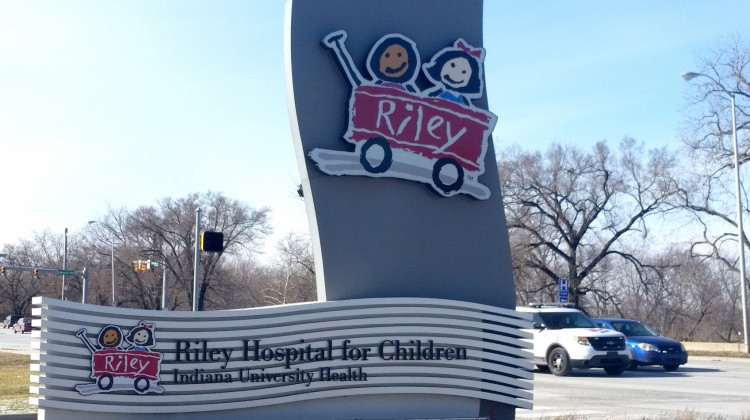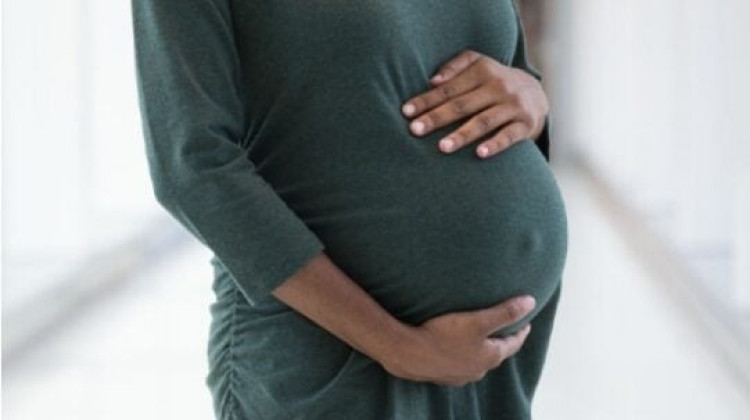
FSSA announced an $8 million partnership between the state and Riley Children’s Health, which includes $4 million in matching funds from Riley. The funds will help provide mental health services at pediatric primary care offices.
Lauren Chapman/IPB NewsThe new three-digit number for the National Suicide Prevention Line, 988, will go live July 16. The Indiana Family and Social Services Administration provided updates on the state’s efforts to address the mental health crisis Thursday, including new funding for pediatric mental health.
FSSA secretary Dr. Dan Rusyniak said it’s important to think about mental health as a part of overall health.
“As with any medical condition, the better we are at prevention, diagnosis and treatment, the healthier and better off we're going to be as individuals, and the healthier and better off we will be as a state,” Rusyniak said.
Hoosiers having a mental health crisis can call 988 to be connected with a trained specialist. People who need help with behavioral health issues, including substance use, can also receive help.
Indiana currently has three mental health call centers prepared to handle 988 calls. The state is in the process of onboarding two additional centers.
Christopher Drapeau, executive director of suicide prevention for the state’s Division of Mental Health and Addiction services, said the organization is strengthening partnerships across the state, including with 211 – which connects Hoosiers to health and social service resources – and Be Well, another statewide crisis help line.
“Through expanding capacity, adding additional centers, and also strengthening these partnerships, we believe we’ll increase the likelihood that whoever is in crisis that reaches 988 will be routed to the right entity, at the right time,” Drapeau said.
Indiana’s call centers currently answer about every 3 out of 4 National Suicide Prevention Lifeline calls, Drapeau said. The other call is routed to a center in another state or dropped. The state’s goal is to answer 90 percent of those calls by 2023.
The state plans to also increase capacity for 988 chat and text services, and standardize the way crisis specialists are trained.
“The reason why we want to make sure we're doing this is that so those in crisis will receive predictable and consistent services, no matter who responds to them moving forward,” Drapeau said.
FSSA also announced an $8 million partnership between the state and Riley Children’s Health, which includes $4 million in matching funds from Riley. The funds will help provide mental health services at pediatric primary care offices.
Riley Children’s Health President Gil Peri said Indiana is not immune to the child mental health crisis. He said about 300,000 children in the state are currently living with mental health conditions.
“We're excited to be able to bring behavioral health professionals to where pediatricians need us, where family medicine physicians who see kids need the expertise that they don't have within their four walls,” Peri said.
About half of the kids in the state that have mental health conditions are undiagnosed, Peri said, and kids want to go to a place that is familiar when dealing with challenges of mental health.
“And so we know that the pediatrician office is the exact location,” Peri said. “And the earlier that we can detect these problems, the better.”
FSSA also provided updates on additional funds and programs to increase the mental health workforce and access to care. The most funding comes from the Community Catalyst Grants program: $54.8 million, which includes $22.3 million of local and grantee match dollars and $32.5 million in federal funds.
The 37 grant recipients include:
- Dove House, Marion County’s largest recovery housing program for women, to expand its inpatient and outpatient substance-use disorder treatment for women in Marion and Dubois counties.
- La Porte County Drug Free Partnership, Inc., for the La Porte Community Resource Intervention’s substance use, instability and suicidal support outreach program. The program will development of outreach teams and create a crisis intervention team and cultural competency training for law enforcement officers.
- The Marion County Reentry Coalition, to help Hoosiers with mental health challenges as they reenter society after incarceration.
- Courageous Healing in Allen County for a program to provide mental health treatment to uninsured and underinsured people
Contact reporter Darian Benson at dbenson@wfyi.org. Follow on Twitter:
 DONATE
DONATE






 Support WFYI. We can't do it without you.
Support WFYI. We can't do it without you.